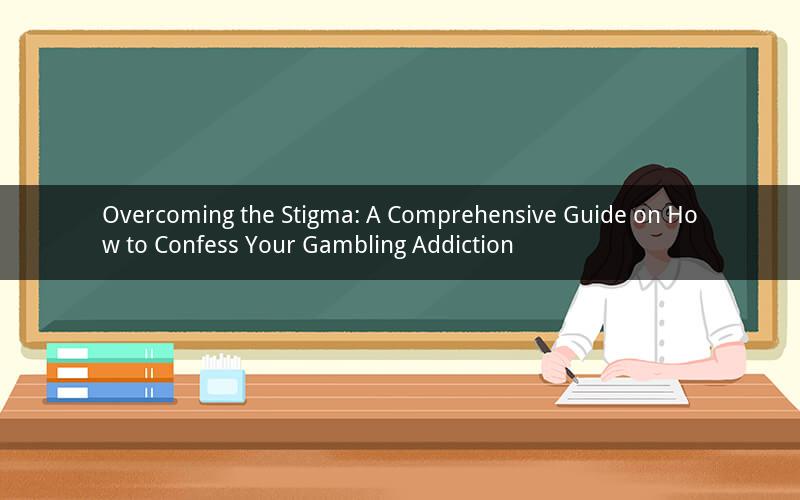
Introduction:
Gambling addiction is a prevalent issue affecting millions of individuals worldwide. The journey to overcoming this addiction often begins with confessing to someone you trust. This guide provides a comprehensive approach on how to tell someone you have a gambling addiction, ensuring that you navigate this sensitive conversation with care and support.
1. Understanding the Importance of Confession:
Before diving into the practical steps, it's crucial to comprehend the significance of confessing your gambling addiction. By acknowledging your problem, you take the first step towards seeking help and support. This confession allows you to break the cycle of secrecy and denial, fostering a healthier and more fulfilling life.
2. Choosing the Right Person:
Identifying the appropriate individual to confide in is crucial. It should be someone you trust and who will offer empathy, understanding, and support. Consider confiding in a close friend, family member, therapist, or a professional counselor specializing in addiction. Remember, the person you choose should be someone you feel comfortable with and believe will be non-judgmental.
3. Preparing for the Conversation:
Preparation is key to ensuring a smooth and successful conversation. Here are some steps to consider:
a. Reflect on Your Journey: Take some time to reflect on your gambling addiction, its impact on your life, and why you have decided to seek help. This self-reflection will help you articulate your feelings and experiences clearly.
b. Choose a Suitable Time and Place: Select a private and comfortable setting where you can have an uninterrupted conversation. Ensure that both parties are in a calm and relaxed state of mind.
c. Prepare What to Say: While it's essential to be honest and transparent, you can prepare some key points to cover during the conversation. This includes explaining the nature of your addiction, its consequences, and your desire for change.
4. Initiating the Conversation:
Now that you are prepared, it's time to initiate the conversation. Here's a step-by-step guide:
a. Express Gratitude: Begin by expressing gratitude for the person's time and willingness to listen. This sets a positive tone for the conversation.
b. Be Direct and Honest: Clearly state that you have a gambling addiction, explaining what it entails and its impact on your life. Avoid sugarcoating or downplaying the severity of the problem.
c. Share Your Feelings: Express your emotions, such as fear, guilt, or shame, without guilt-tripping the other person. Acknowledge the difficulties you have faced and the desire to overcome your addiction.
d. Emphasize Your Commitment to Change: Reassure the person that you are committed to seeking help and making positive changes. Share your intentions to seek professional support or join a support group.
5. Handling the Reaction:
The person's reaction to your confession can vary. Here are some ways to handle different scenarios:
a. Empathy and Support: If the person responds with empathy and offers support, express your gratitude. Emphasize your willingness to accept their help and guidance.
b. Non-judgmental Understanding: If the person is initially judgmental or confused, provide them with information about gambling addiction and its impact. Encourage them to learn more about the issue and offer support in their own way.
c. Respectful Disagreement: If the person is not receptive or understanding, respect their viewpoint while maintaining your boundaries. Explain that you are seeking support from others who can provide the necessary assistance.
6. Seeking Professional Help:
After confessing your gambling addiction to someone you trust, it's crucial to seek professional help. Consider the following options:
a. Therapists and Counselors: Seek out a therapist or counselor specializing in addiction. They can provide personalized treatment and support tailored to your needs.
b. Support Groups: Joining a support group, such as Gamblers Anonymous, can offer a sense of community and support from individuals facing similar challenges.
c. Treatment Facilities: In severe cases, residential treatment facilities can provide a structured environment to overcome your addiction and develop essential coping skills.
7. Building a Support Network:
Creating a support network is vital for long-term recovery. Consider the following steps:
a. Reach Out to Others: Share your experience with trusted friends and family members who can offer support and encouragement.
b. Join Online Communities: Online forums and communities can provide a platform to connect with others who understand your struggles and offer valuable insights.
c. Maintain Regular Check-ins: Regularly schedule check-ins with your therapist, counselor, or support group members to monitor your progress and address any challenges.
Conclusion:
Telling someone you have a gambling addiction is a significant step towards overcoming this challenge. By following the steps outlined in this guide, you can navigate this sensitive conversation with care and support. Remember, seeking help is the first step towards a healthier and more fulfilling life.
Questions and Answers:
1. Q: How can I ensure that the person I confide in will be supportive?
A: Choose someone you trust and believe will offer empathy and understanding. Share your feelings without guilt-tripping them, and express your desire for support.
2. Q: Should I confess my addiction to multiple people at once?
A: It's generally more effective to confide in one person at a time. This allows for a more focused and meaningful conversation.
3. Q: What if the person I confide in is judgmental or unresponsive?
A: Respect their viewpoint and maintain your boundaries. Consider seeking support from others who can provide the necessary assistance.
4. Q: Can I confide in someone who has had a similar experience?
A: Absolutely! Sharing your addiction with someone who has gone through a similar journey can offer valuable insights and support.
5. Q: How long will it take to overcome my gambling addiction?
A: The duration of recovery varies for each individual. With professional help, support, and dedication, many individuals successfully overcome their addiction within a few months to a few years.